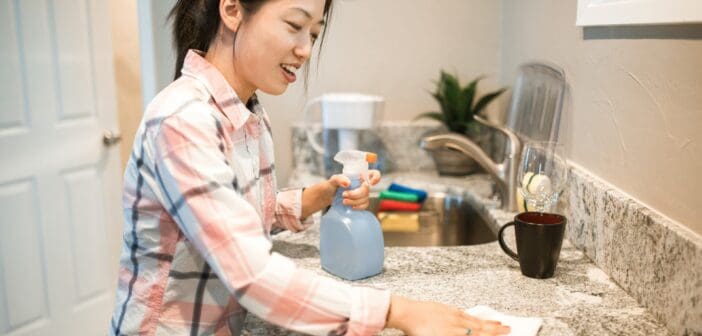The kitchen is the only place in your home that’s dedicated to cooking and storing delicious food. Whether you’re frying some eggs for breakfast or baking pastries for a family feast, every appetizing dish must pass through your kitchen. That being said, the cooking process can get messy. Your kitchen appliances might have accumulated food residues and your floor may be sticky from food spatters over the past few months.
However, you may not have the time to clean your whole kitchen after every use, and that’s perfectly fine. Not every part of your kitchen needs to be cleaned on a daily basis. What matters most is knowing what to clean and when to clean them. Once you know this, you can prioritize the areas that require your immediate attention. By doing so, you can create a cleaning routine that will keep your kitchen in pristine condition without needing to devote much time.
If you’d like to know how often you should clean your kitchen areas and items, below are some tips to help you plan your maintenance routine:
Daily Cleaning
These are the kitchen spots that require constant care, as they always come in contact with food and dishes. For a hygienic cooking environment, here are some things you should be cleaning every day:
Sink
Your sink provides you with the proper space to clean all your dirty cookware and dishes. However, it also needs a daily scrub to prevent it from acquiring stains and harbouring harmful bacteria. Without proper cleaning, this bacteria can spread to your hands and food items, causing a variety of illnesses. Additionally, a sink that isn’t regularly cleaned is likely to develop an unpleasant odour.
To clean your sink, simply scrub its surface with a sponge using warm water and dish soap. You can also use a mixture of baking soda and vinegar to remove any stubborn stains.
Countertops
From ingredient preparation to meal layout, a countertop is an indispensable part of your kitchen. Much like sinks, countertops frequently come into contact with your food items, which means that they can get quite dirty. To prevent the spread of bacteria, it’s best to clean your countertop once you’ve finished cooking. You can spray some disinfectant on it and use a microfiber cloth to wipe it down. Some brands also sell disposable disinfectant wipes for a quick cleanup.
Weekly Cleaning
Certain parts of your kitchen deserve frequent care but don’t require daily maintenance. Below are some kitchen areas and items that require weekly cleaning:
Floor
While it’s better to clean your kitchen floor every day, a thorough mopping each week should suffice. Food residue and grease can accumulate on your floor, leaving it sticky and dirty. Mopping with a mixture of water and gentle detergent should leave most kitchen floors squeaky clean.
Kitchen Appliance Surfaces
Much like your floor, the surfaces of your appliances can become grubby over time. This includes surfaces like your refrigerator handles and stovetops. Cleaning them with a cloth and some disinfectant will keep them in mint condition throughout the week.
Monthly Cleaning
If you’re dealing with a busy schedule, it’s good to know that some parts of your kitchen only need the occasional check-up. Below are some things that require a good cleaning every month:
Cookware and Kitchen Tools
It’s best to check the state of your cookware or kitchen tools on a monthly basis. You may have some knives that require sharpening or pots that need an extra scrub. It’s also the perfect time to take stock of your kitchen equipment and see which ones need replacing.
Sink Drain
Nothing is worse than a clogged sink while you’re washing the dishes. You may have to call a plumber and deal with a lot of dirty dishwater. To prevent this from happening, it’s best to give your drain a monthly cleanse. Pour some baking soda and salt into your drain, followed by a cup of vinegar. After fifteen minutes, pour boiling water to flush down any remaining food residue. Voila! Your sink will be ready for your next dishwashing session.
Cleaning Every Three Months
Lastly, it’s important to clean the interiors of your kitchen appliances at least once every three months. This is especially true for appliances that come into contact with food like your microwave or toaster oven. Your refrigerator should also be cleaned to ensure that your food is stored in an odour- and bacteria-free environment.
Wipe down your refrigerator’s shelves with warm soapy water, then wash and dry its drawers before placing them back in. Make sure to remove all the items inside before you start cleaning. This also gives you the opportunity to remove any rotten or expired products so your inventory stays fresh and organized.
It’s important to keep your kitchen clean, operational, and free of any unpleasant odours. This way, you can promote a hygienic environment that discourages the growth of bacteria, safeguarding you and your family’s health. After all, you’ll want to be in a comfortable and welcoming space while you’re cooking your next delectable meal.




